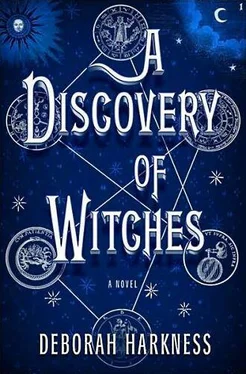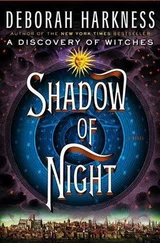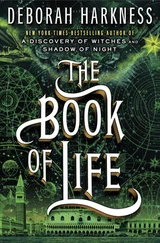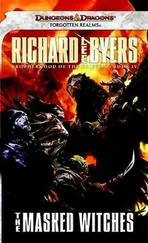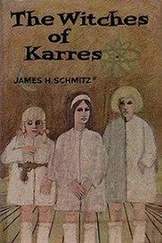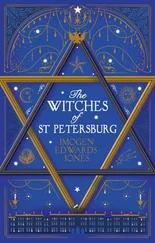My mother would instinctively have known the answer, had she been standing in my place. Most members of the Bishop family were talented witches, but my mother, Rebecca, was special. Everyone said so. Her supernatural abilities had manifested early, and by the time she was in grade school, she could outmagic most of the senior witches in the local coven with her intuitive understanding of spells, startling foresight, and uncanny knack for seeing beneath the surface of people and events. My mother’s younger sister, my Aunt Sarah, was a skilled witch, too, but her talents were more mainstream: a deft hand with potions and a perfect command of witchcraft’s traditional lore of spells and charms.
My fellow historians didn’t know about the family, of course, but everyone in Madison, the remote town in upstate New York where I’d lived with Sarah since the age of seven, knew all about the Bishops. My ancestors had moved from Massachusetts after the Revolutionary War. By then more than a century had passed since Bridget Bishop was executed at Salem. Even so, rumors and gossip followed them to their new home. After pulling up stakes and resettling in Madison, the Bishops worked hard to demonstrate how useful it could be to have witchy neighbors for healing the sick and predicting the weather. In time the family set down roots in the community deep enough to withstand the inevitable outbreaks of superstition and human fear.
But my mother had a curiosity about the world that led her beyond the safety of Madison. She went first to Harvard, where she met a young wizard named Stephen Proctor. He also had a long magical lineage and a desire to experience life outside the scope of his family’s New England history and influence. Rebecca Bishop and Stephen Proctor were a charming couple, my mother’s all-American frankness a counterpoint to my father’s more formal, old-fashioned ways. They became anthropologists, immersing themselves in foreign cultures and beliefs, sharing their intellectual passions along with their deep devotion to each other. After securing positions on the faculty in area schools—my mother at her alma mater, my father at Wellesley—they made research trips abroad and made a home for their new family in Cambridge.
I have few memories of my childhood, but each one is vivid and surprisingly clear. All feature my parents: the feel of corduroy on my father’s elbows, the lily of the valley that scented my mother’s perfume, the clink of their wineglasses on Friday nights when they’d put me to bed and dine together by candlelight. My mother told me bedtime stories, and my father’s brown briefcase clattered when he dropped it by the front door. These memories would strike a familiar chord with most people.
Other recollections of my parents would not. My mother never seemed to do laundry, but my clothes were always clean and neatly folded. Forgotten permission slips for field trips to the zoo appeared in my desk when the teacher came to collect them. And no matter what condition my father’s study was in when I went in for a good-night kiss (and it usually looked as if something had exploded), it was always perfectly orderly the next morning. In kindergarten I’d asked my friend Amanda’s mother why she bothered washing the dishes with soap and water when all you needed to do was stack them in the sink, snap your fingers, and whisper a few words. Mrs. Schmidt laughed at my strange idea of housework, but confusion had clouded her eyes.
That night my parents told me we had to be careful about how we spoke about magic and with whom we discussed it. Humans outnumbered us and found our power frightening, my mother explained, and fear was the strongest force on earth. I hadn’t confessed at the time that magic—my mother’s especially—frightened me, too.
By day my mother looked like every other kid’s mother in Cambridge: slightly unkempt, a bit disorganized, and perpetually harassed by the pressures of home and office. Her blond hair was fashionably tousled even though the clothes she wore remained stuck in 1977—long billowy skirts, oversize pants and shirts, and men’s vests and blazers she picked up in thrift stores the length and breadth of Boston in imitation of Annie Hall. Nothing would have made you look twice if you passed her in the street or stood behind her in the supermarket.
In the privacy of our home, with the curtains drawn and the door locked, my mother became someone else. Her movements were confident and sure, not rushed and hectic. Sometimes she even seemed to float. As she went around the house, singing and picking up stuffed animals and books, her face slowly transformed into something otherworldly and beautiful. When my mother was lit up with magic, you couldn’t tear your eyes away from her.
“Mommy’s got a firecracker inside her,” was the way my father explained it with his wide, indulgent grin. But firecrackers, I learned, were not simply bright and lively. They were unpredictable, and they could startle and frighten you, too.
My father was at a lecture one night when my mother decided to clean the silver and became mesmerized by a bowl of water she’d set on the dining-room table. As she stared at the glassy surface, it became covered with a fog that twisted itself into tiny, ghostly shapes. I gasped with delight as they grew, filling the room with fantastic beings. Soon they were crawling up the drapes and clinging to the ceiling. I cried out for my mother’s help, but she remained intent on the water. Her concentration didn’t waver until something half human and half animal crept near and pinched my arm. That brought her out of her reveries, and she exploded into a shower of angry red light that beat back the wraiths and left an odor of singed feathers in the house. My father noticed the strange smell the moment he returned, his alarm evident. He found us huddled in bed together. At the sight of him, my mother burst into apologetic tears. I never felt entirely safe in the dining room again.
Any remaining sense of security evaporated after I turned seven, when my mother and father went to Africa and didn’t come back alive.
I shook myself and focused again on the dilemma that faced me. The manuscript sat on the library table in a pool of lamplight. Its magic pulled on something dark and knotted inside me. My fingers returned to the smooth leather. This time the prickling sensation felt familiar. I vaguely remembered experiencing something like it once before, looking through some papers on the desk in my father’s study.
Turning resolutely away from the leather-bound volume, I occupied myself with something more rational: searching for the list of alchemical texts I’d generated before leaving New Haven. It was on my desk, hidden among the loose papers, book call slips, receipts, pencils, pens, and library maps, neatly arranged by collection and then by the number assigned to each text by a library clerk when it had entered into the Bodleian. Since arriving a few weeks ago, I had been working through the list methodically. The copied-out catalog description for Ashmole 782 read, “Anthropologia, or a treatis containing a short description of Man in two parts: the first Anatomical, the second Psychological.” As with most of the works I studied, there was no telling what the contents were from the title.
My fingers might be able to tell me about the book without even cracking open the covers. Aunt Sarah always used her fingers to figure out what was in the mail before she opened it, in case the envelope contained a bill she didn’t want to pay. That way she could plead ignorance when it turned out she owed the electric company money.
The gilt numbers on the spine winked.
I sat down and considered the options.
Ignore the magic, open the manuscript, and try to read it like a human scholar?
Читать дальше
